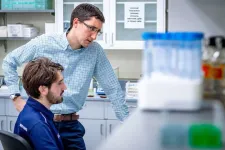(Press-News.org)
Systemic sclerosis causes the skin to tighten and harden resulting in a potentially fatal autoimmune condition that is associated with lung fibrosis and kidney disease.
University of Michigan Health researchers have studied the pathology of systemic sclerosis to understand better the disease and identify key pathways in the disease process that can be targeted therapeutically.
A research team led by University of Michigan Health’s Dinesh Khanna, M.B.B.S., M.Sc., professor of rheumatology and Johann Gudjonsson, M.D., Ph.D., professor of dermatology, in collaboration with John Varga, M.D., professor and chief of rheumatology, characterized the major cellular sources of fibrosis in the skin of patients with systemic sclerosis skin, identifying myofibroblasts and a subset of endothelial cells as the major contributors.
The research examined the Hippo signaling pathway, an evolutionarily conserved signaling pathway that plays a complex role in cellular function as a major pathway promoting fibrosis in systemic sclerosis.
By directly targeting the Hippo signaling pathway, the research team demonstrated a reversal of the pro-fibrotic responses in both myofibroblasts and endothelial cells.
The discovery of this function of the Hippo signaling pathway in systemic sclerosis ties back to prior work that identified a regulator of this pathway as a key driver of sex biased immune responses, providing evidence that may help explain why systemic sclerosis is much more common in women than men.
The findings reported in this paper showed a marked effect from the drug verteporfin, which targets the Hippo signaling pathway, and rapid reversal of the pro-fibrotic phenotype in both myofibroblasts and endothelial cells.
“Verteporfin is approved for treatment of a subtype of macular degeneration suggesting that it could be repurposed towards treating systemic sclerosis,” said Gudjonsson.
“This work helps shift the focus towards a novel pathway that is a key driver of the major features observed in systemic sclerosis and has the potential to be able to move quickly to testing in clinical trials.”
Furthermore, the researchers believe the unique and comprehensive nature of the data generated in this project may become valuable to other investigators studying systemic sclerosis.
“This is something that Khanna and I aim to move towards creating a proof of concept trial in the near future for to test this theory and further advancements in systemic sclerosis treatment and care,” said Gudjonsson.
Additional authors include: From the University of Michigan: Feiyang Ma Pei-Suen Tsou, Danielle Ochocki, Mehrnaz Gharaee-Kermani, Olesya Plazyo, Xianying Xing, Joseph Kirma, Rachael Wasikowski, William D. Brodie, and J. Michelle Kahlenberg and Allison C. Billi.
Disclosure: There is a patent pending on the use of verteporfin to treat systemic sclerosis.
Michigan Research Core: Advanced Genomics Core
Citation: “Systems-based identification of the Hippo pathways for promoting fibrotic mesenchymal differentiation in systemic sclerosis,” Nature Communications. DOI: doi.org/10.1038
END
It has been long assumed that Utah’s Bonneville Salt Flats was formed as its ancient namesake lake dried up 13,000 years ago. But new research from the University of Utah has gutted that narrative, determining these crusts did not form until several thousand years after Lake Bonneville disappeared, which could have important implications for managing this feature that has been shrinking for decades to the dismay of the racing community and others who revere the saline pan 100 miles west of Salt ...
A $10.6 million training grant has been awarded to the University of Maryland School of Medicine (UMSOM) and University of Maryland, Baltimore (UMB) to administer Maryland’s Abortion Clinical Care Training Program. The grant will be used to expand the number of healthcare professionals with abortion care training, increase the racial and ethnic diversity among health care professionals with abortion care education, and support the identification of clinical sites needing training.
“Our training will target a major ...
· Most women with ovarian cancer develop resistance to chemotherapy
· Nanoparticle fools cancer cells and prevents cholesterol from entering
· More than 18,000 women a year die from ovarian cancer
CHICAGO --- Women diagnosed with ovarian cancer may initially respond well to chemotherapy, but the majority of them will develop resistance to treatment and die from the disease.
Now Northwestern Medicine scientists have discovered the Achilles heel of chemotherapy-resistant ovarian cancer — its hunger for cholesterol — and how to sneakily use that to destroy it.
In a new study, scientists first showed that chemotherapy-resistant ...
“There’s a narrative out there about climate change that says there are winners and losers. Even if most of the planet might lose from the changing climate, certain industries and countries stand to benefit. And Russia is usually at the tip of people’s tongues, with Russian officials even making the claim that Russia is a potential winner.”
This portrayal, described by Debra Javeline, associate professor of political science at the University of Notre Dame and lead author on the recently published study “Russia in a changing climate,” was debated ...
University of North Carolina at Chapel Hill researchers have developed a new drug delivery platform that harnesses helical amyloid fibers designed to untwist and release drugs in response to body temperatures.
A new research paper published on Jan. 26 in Nature Communications reveals groundbreaking structural details into how diseases form much like Alzheimer’s disease. With this knowledge, the group may have uncovered a unique mechanism to reverse both the deposits and their impact on those suffering from these conditions.
UNC-Chapel Hill researcher Ronit Freeman ...
New York, NY (February 21, 2024) – A novel treatment for polycythemia vera, a potentially fatal blood cancer, demonstrated the ability to control overproduction of red blood cells, the hallmark of this malignancy and many of its debilitating symptoms in a multi-center clinical trial led by the Icahn School of Medicine at Mount Sinai.
In the phase 2 study, the drug rusfertide limited excess production of red blood cells, the main manifestation of polycythemia vera, over the 28-week course of ...
Body composition — often expressed as the amount of fat in relation to muscle — is one of the standard predictors of cardiac health. Now, new research from the University of California San Diego indicates more muscle doesn’t automatically mean lower risk of heart trouble.
The study, published in the Journal of the American Heart Association, found all muscle isn’t the same. Britta Larsen, PhD, says men with a higher area of abdominal muscle have a greater risk of cardiac trouble. It’s a completely different ...
EMBARGOED FOR RELEASE UNTIL 4 P.M. ET, WEDNESDAY, FEBRUARY 21, 2024
MINNEAPOLIS – People with higher exposure to traffic-related air pollution were more likely to have high amounts of amyloid plaques in their brains associated with Alzheimer’s disease after death, according to a study published in the February 21, 2024, online issue of Neurology®, the medical journal of the American Academy of Neurology. Researchers looked at fine particulate matter, PM2.5, which consists of pollutant particles of less than 2.5 microns in diameter suspended in air.
The study does not prove that air pollution causes more amyloid plaques in the brain. It only ...
More than 40% of Americans know someone who has died of a drug overdose and about one-third of those individuals say their lives were disrupted by the death, according to a new RAND study.
Analyzing a national representative survey of American adults, researchers found that the lifetime exposure to an overdose death is more common among women than men, married participants than unmarried participants, U.S.-born participants than immigrants, and those who live in urban settings as compared to those in rural settings.
Rates of exposure were significantly higher in New England (Connecticut, Maine, Massachusetts, ...
The University of Notre Dame has received a Collaborative Pairs Pilot Project Award from the Chan Zuckerberg Initiative to study genes that affect neurodegenerative diseases, such as Alzheimer’s disease.
This is Notre Dame’s first award from the Chan Zuckerberg Initiative.
The award will fund a partnership between Cody Smith, the Elizabeth and Michael Gallagher Associate Professor of Biological Sciences at Notre Dame and a 2017 Alfred P. Sloan Fellow, and Beth Stevens, member of the Broad Institute of MIT and Harvard and a 2015 MacArthur Fellow. With their combined expertise in neurological development, they will explore how gene expression and function changes with ...



